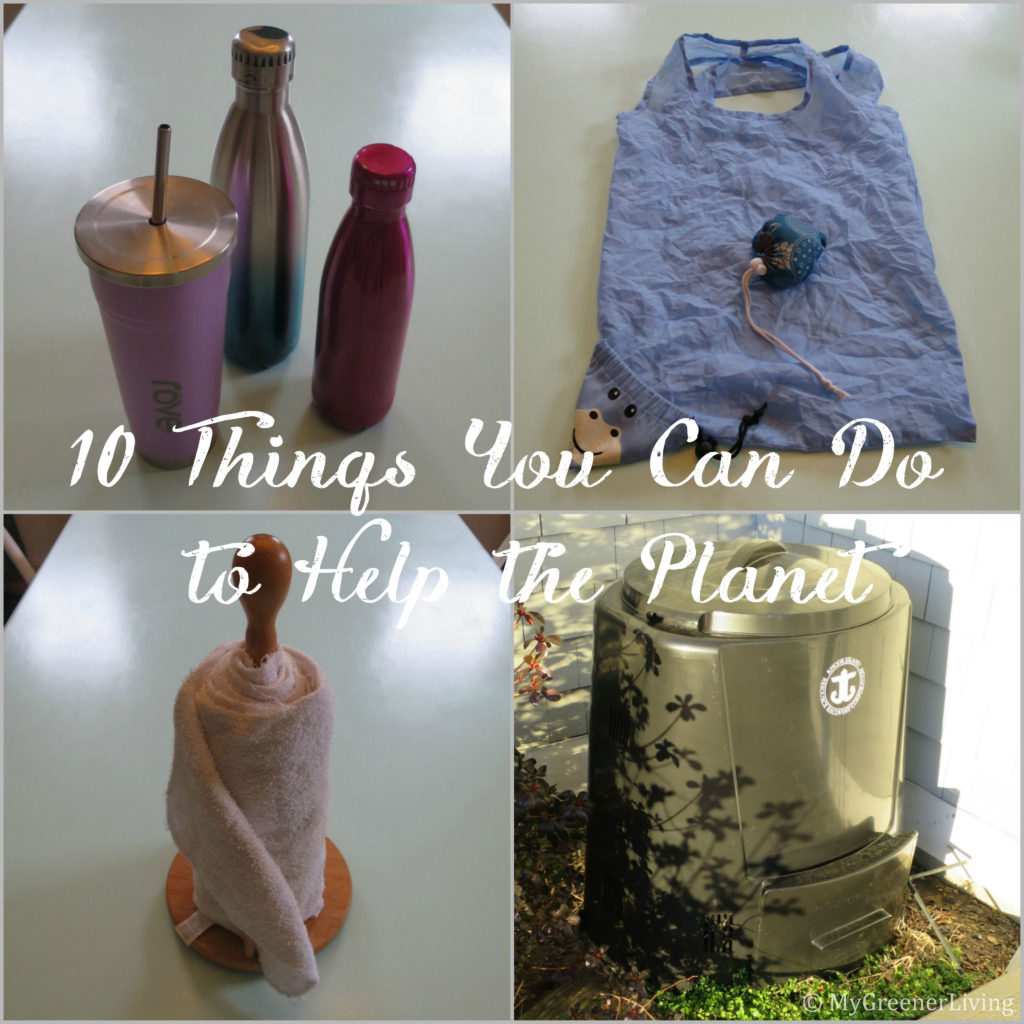Happy Earth Day!

Here are 10 simple things you can do in your day to day life to help our beautiful earth. Adopt as many or few as you can – every little bit helps! If you’re trying to work yourself into a greener way of living, try picking one or two to start this week, and consider adding on more every month or two.
Disclaimer: This post contains affiliate links. See my Disclosure Policy for more information.
10 Things You Can Do to Help the Planet
- Invest in a reusable water bottle – and use it! I love glass and stainless steel bottles because they don’t absorb smells/flavors, and the material can be recycled essentially infinitely after you’re done using it.
- Buy or make reusable grocery bags and keep them somewhere you’ll remember to use them. I keep some small bags in my purse and larger bags in my car. Some people have found it works well to store the bags near the front door, or over the door knob.
- Buy used instead of new. Manufacturing new products use a lot of resources including water and electricity, so when you are able to purchase an item used, you not only saved money but also helped save the planet! Use your discretion – obviously there are some things that could pose a health risk or it’s just not right for you to purchase used. Some examples of used items I have purchased include: clothing, wood furniture, mason jars, handmade blankets.
- Repair instead of replace. Learn simple sewing to mend a tear or sew a button back on a shirt. Search youtube.com for videos to repair broken household items. If you can’t do the repair yourself, consider bartering with a friend or hiring someone. There are often inexpensive fixes that both save you money and keep your items out of the landfill.
- Conserve resources at home: turn off lights when you leave the room or don’t need them. Turn off water when you’re brushing your teeth. Take shorter showers and/or use a water flow restrictor to reduce water flow when lathering shampoo in your hair, soaping up, etc.
- Avoid single use products. Water bottles. Plastic utensils. Paper plates. Paper towels. Commit a few more minutes (often as short as seconds) to your day cleaning, and use reusable products.
- Purchase quality products. Consider value of a product, not just price. Purchase items that will last. You’ll help the planet by keeping products out of the landfill longer, and by reducing the need for more items to be manufactured. Plus you’re saving yourself money in the long run.
- Donate good condition items that you no longer want or need. Keep these unwanted items out of landfills! If you look around donation collection organizations in your area, you’ll likely find that items from wearable clothing and furniture to torn towels and excess holiday decor can be donated!
- Recycle. When can’t avoid buying products in packaging or the endless junk mail, be sure to recycle the recyclable items! Check with your town or state to identify what can be recycled and how to recycle items.
- Compost. Much of Americans’ household garbage that ends up in the landfill is food waste. Check if your town has a compost program, or start your own compost pile for your fruit and veggie kitchen scraps. Read here for more information about what can and cannot be composted in a backyard compost pile or bin.
What other things do you do to help the planet?

 I grew up frugal, and understanding the value of money. I work hard for what I earn, and I don’t want to waste it. Here are my top 10 tips for saving money shopping. If you’re looking for apps and websites to help you have money,
I grew up frugal, and understanding the value of money. I work hard for what I earn, and I don’t want to waste it. Here are my top 10 tips for saving money shopping. If you’re looking for apps and websites to help you have money,